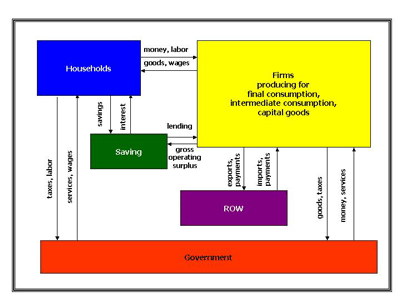
some others that Iíve forgotten. The official accounting rules Ė the System of National Accounts, itís called Ė is a 700-page technical manual that explains picky details about what a product is, what makes an activity be part of our economy and not our neighborís, what we add together to calculate Gross National Product or growth rates or productivity or other economic measures that we hear about on the news every day.
Accounting is fascinating if you enjoy the repeated realization that the devil really is in the details. Sure, itís incredibly dull to think about the difference between rock that gets pulled out of a mineshaft and dumped in a heap and rock that gets pulled out of a mineshaft and dumped on a driveway. But hey, that matters! Rock that gets dumped in a heap is waste, it causes environmental problems later on and contributes nothing to the economy. Rock that gets dumped on a driveway is
being recycled. It has an economic value, it saves the mining company money that it can spend on more useful things than piling up excess rock, it provides input goods to a landscaper without having to take other materials out of the environment, it means someone has a pervious gravel driveway instead of an impervious cement one. If our accounts let us see the different between rock in a heap and rock in a driveway, we know how well weíre doing at recycling instead of consuming more than we need to. And knowing how well weíre doing is important, because we want to put our effort into the most productive activities Ė but to find them, we have to know how weíre doing.
Details, sure. Picky stuff. But picky stuff that could make us into a more efficient, more sustainable society, a society that put its efforts into reusing things instead of making new ones and keeps its environment clean instead of suffering from contamination later on.
Environmental accounting is about figuring out how to use the SNA to track the links between our economy and our environment, and how to modify the SNA if it doesnít do a good enough job as itís written. My book is an attempt to explain how people really do environmental accounting, and why, and how the structure of the conventional accounts dictates what we can and cannot do in the environmental accounts. And from there, how well the environmental accounts will really let us understand and perhaps resolve our environmental problems. Right now only the accountants know how the environmental accounts really work, because it is picky and technical, because to understand the environmental accounts, all 700 pages of them, you have to understand many of the 700 pages of the SNA, as well. But I want more people to know how the environmental accounts work Ė environmentalists, and policy people, and economists, and people who donít even know what the national income accounts are but do want our society to make more informed decisions about how we use resources and how we keep our air and water clean for our grandchildren and their grandchildren. So Iíve been trying to explain it all in plain English, to people who donít have any of the background, who have never heard of the production boundary or supply and use tables, who donít know what we mean by a balancing item.
Even people like you, perhaps.